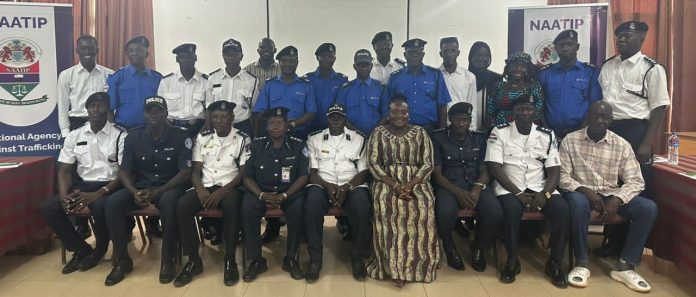By Ndey Sowe
The National Agency against Trafficking in Persons (NAATIP) trained 30 station officers within the Kanifing Municipality on Monday, 30 September 2024, on trafficking in persons at the NaNA conference hall.
The training aims to ensure the identification of victims of TIP and understanding of the indicators of human trafficking and the National Referral Mechanism (NRM). The training avails participants knowledge of how to identify the difference between TIP and smuggling, and to know what administrative procedures to take in referring such cases to the agency, among others.
Speaking at the training, Isatou Dabo, the Executive Director of NAATIP called on the government to allocate more funds to the agency and said trafficking in persons is an area that requires a lot of resources.
“Financial challenges continue to be a problem for the Agency, but we are in a better place than we were before,” she disclosed, adding that the fight against human trafficking is a top priority for the government of The Gambia, which has committed resources to the cause and remains determined to continue its efforts.
“The Government and the Agency are resolved to prosecute offenders and create a safe, trafficking-free environment for all,” she said.
She added that her Agency recognizes the critical need to prevent human trafficking, protect vulnerable individuals, and prosecute those who commit such severe violations of fundamental human rights. She outlined that her Agency remains dedicated to prioritizing the prevention of trafficking, the protection of victims, and the prosecution of offenders in The Gambia.
Over the years, she said her Agency has trained law enforcement officers from different units of the country’s security outfit.
She, however, said that as the number of victims of trafficking increased over time, her Agency realized that police stations across the country need some basic knowledge on how to receive cases of trafficking before referral to NAATIP. She emphasized that if station officers who happen to be the heads of these different offices understand the signs and indicators of trafficking and can identify victims of trafficking, they would equally be in a position to know what steps to take in protecting victims of trafficking at the very start of a case, and this she said would be a step in the right direction.
“Smuggling of migrants is a problem in The Gambia. If our frontline officers are not able to distinguish the difference between smuggling of migrants and trafficking in persons, there is a chance that a case of trafficking in persons may be reported to a station and it might not be given the necessary attention it deserves, “she said. She continued to say that there is a possibility that there might be confusion between trafficking in persons and smuggling of migrants, and said the treatment required or requested for each of these cases may be different, depending on the case-to-case basis.
She further pointed out their importance as front liners or station officers responsible for their subordinates, to understand issues that surround trafficking, and to know how to handle and provide immediate services to victims most importantly, to follow the procedure as stated in the NRM. She expressed the importance of equipping stakeholders with the requisite knowledge and skills to be able to continue to partner with NAATIP and said all this is geared towards ensuring the protection of victims of trafficking in The Gambia.


















